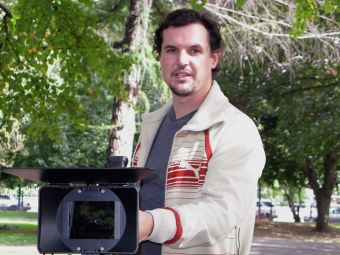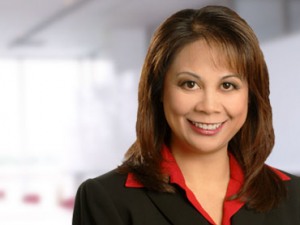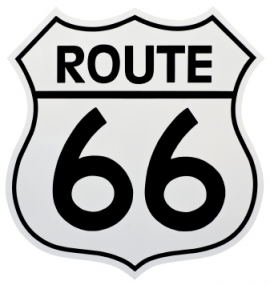Nonclinical Jobs For Doctors?

Not sure if a cashier is what most doctors are thinking when they're looking for nonclinical physician careers and opportunities.

Not sure if a cashier is what most doctors are thinking when they're looking for nonclinical physician careers and opportunities.
 Why would a physician leave clinical practice and start making movies?
Why would a physician leave clinical practice and start making movies?What am I? A doctor? A filmmaker? That question has frequently run through my mind over the last 5 years. It was planted in my brain by an Emergency Department director I had about 5 years ago that said to me upon my annual review before signing a new contract, “I’m not sure I want a wanna be filmmaker and a part time doctor working for me.” Needless to say I didn’t sign that contract.
Let’s look at the facts. I went to medical school, and even finished without getting thrown out. I passed all my board exams and I matched my first choice for an Emergency Medicine residency in Pittsburgh, that I somehow managed to survive without killing too many patients, any other doctors or myself. I became board certified in Emergency Medicine and I have been working in real live ERs for the last 9 years. So I guess that makes me a bone fide doctor. I can’t say that from the time I was three years old I wanted to be a doctor, but somewhere along the line I felt like having a profession that helped people, had reasonable job security and made a fair wage seemed like a good idea. Now I understand the concept of hindsight.
Scared and cynical, that pretty much summed up my state of mind when thinking about my medical career 5 years ago. Those same sentiments held true for my opinion on the future of the medical system in general. That was why I had to make a change.
Initially that change was to become a “part time” doctor. I felt like scaling back my hours would stave off the impending burnout and help me focus on what was important with my life. And it did help, a little, and for a short period of time. But even only working 8 shifts a month, within a few minutes into a shift I’d be right back into the same frustration and anger I felt on my last work day.
So I decided to quit. For the first time that I can remember (except during pee wee football when I realized I was more of the soccer type) I was going to quit something. But after 15 years of school and training to become a physician, I wasn’t going to walk away without at least a little bit of self examination. I had to see what was wrong with me and why I couldn’t “hack” being a practicing doctor. That’s where being a “wanna be” filmmaker comes in as I decided to examine the “what’s wrong with me question” on camera. The product is The Vanishing Oath, a documentary film that looks at the obstacles doctors and their patients face, from the inside of the healthcare machine.
So I am a doctor, I have the paperwork to prove it. As for being a filmmaker, that’s harder to define. When is one considered a “writer” or a “painter” or a “filmmaker”? Is it when you complete your first book or film, or is it when you can say you earn your living off of your art. So by the first definition, I AM A FILMMAKER. By the second definition I’M A WANNA BE.
So if ever asked again, “are you a doctor or a film maker?” I can now answer:
“If being to be a real doctor is having to suffer hours on end, affect little change in my patients lives because the system doesn’t allow it, and destroy my own health and family to do so, then NO I’M NOT a real doctor.” “And if by exploring and learning about the realities of medical care in this country and further igniting my passion to help my colleagues and ultimately our patients then, YES I AM filmmaker”.
And proud of it.
 What's a physician's day look like if you're a medical reporter?
What's a physician's day look like if you're a medical reporter?10:00 Welcome to my day! At my desk in the newsroom, I check the assignment rundown. I have not yet been given a news assignment. So I surf the web to see what the medical "buzz" is today. I assemble a list of possibilites to present to my news director and assistant news director. Considerations: How many people does the issue affect? Would it appeal to our target demographic of 30, 40, and 50-somethings? Is there a local connection? Then I wait for a decision.
11:25 My assignment has been deemed. "Walk Fast, Live Longer," it's slugged. It's a JAMA study led by a local researcher looking at walking speeds of those over 65 (a detail that will get only brief mention, for it's not "our demo"). Those who walked faster, lived longer. So now, I have to get hold of the lead author and set up an interview on camera. I need to make sure the assignment desk has a news photographer for me. To add to the pressure of the day, this is going to be a promoted piece for the 5:00, i.e. there will be commercials urging you to watch this very interesting piece.
11:46 I have received word the lead author is available, but not until 2:15. Immediate thought: Ugh. This will have to be a quick interview in order to get back in time to get this put together for the 5:00 news. The assignment desk has a photographer for me, but not until 1:00. To make the most use of our short time we'll get b-roll (video to accompany the spoken word for the piece) prior to the sit-down with the doc.
12:03 Since we will be short on time later, I've put together a basic outline of my report, including where the comments from the doc might be best suited. I've jotted down what b-roll might be useful, and what questions might provoke a more emotional response, rather than just a bland, informational one. After all, I have the information in front of me (I got the PDF from JAMA), and I can summarize it more efficiently in plain language for the viewer. They want to see the researcher is a caring human being who has analyzed an issue that has personal relevance to them.
1:20 My producer has a great idea to actually demonstrate the walking speeds. How to do this? We don't have a stop watch. We could ask the researcher to demonstrate. Or...we could go to a gym and set up three treadmills side by side, and have volunteers walk at the three different speeds. Now, to find a willing gym on short notice...
1:38 Set up the YMCA for 3:00...so now, quickly, let's knock out some b-roll and the interview.
1:50 On college campus near the doctor's academic office. Not many walking about in the study's age range, but my photog grabbed a few.
2:15 At the doctor's office, setting up the camera. We are ready to go, but the Voice of America phone interview with the doctor, which was supposed to begin at 2:00 but got a late start, is running over. To add to the stress, there are two additional people in the office with us fussing with the doctor's computer. It's clear they aren't figuring out what the problem is and might be a while.
Finally the doctor comes in, and miraculously and simultaneously, her computer people give up. The interview goes fine, in other words, I hear the sound bites I'm going to use as they spill out of her mouth. That is a gift, especially when time is limited. She has video clips of walkers on her computer that we shoot to add to our b-roll. Then the doctor has the idea to set up a demonstration of the different walking speeds in her study by having staff show us in her lab upstairs. It would save us a trip to the gym. But first, we get a few shots of the journal article in an actual hardcopy JAMA in her office -- bonus! It is now 2:50.
3:00 After discussing with the 5:00 producer the new demonstration opportunity and the late hour of the day, I called the Y to tell them thanks, but we won't be out there after all. Meanwhile, the staff is deliberating over how the lab demonstration will go. One problem: the study was done in metric -- generally unrelatable for the average viewer. After some conversion to miles per hour, the walking speeds are established, and we shoot. My talented and insightful photographer gets several different angles of the walking to make it easier on the editor later.
3:30 We're dashing back to the station, where I quickly have to log the tape (type out my interview and b-roll), write my piece, track it (record my words on tape), and get it into editing, where the editor pushes buttons ona machine to melds the words and images together. The process is interrupted by someone in the station's marketing department, wanting to see if I'm available to emcee a "Sesame Street Live" show.
5:15 My piece is in editing. I scurry to the ladies room to put on my HD (high-definition) makeup. I print my intro and tag.
5:30 I'm to be on X-cam? I'm to be on X-cam! (A live camera just outside the studio door thought to convey a sense of urgency and importance.) Problem is, there's no obvious X-cam set up and no photographer. I stomp up to the assignment desk to find out what's going on.
5:35 OK, now there is X-cam. Whew! I bundle up for the cold.
5:40 Five minutes to my hit, I go outside so the control room can see the shot and check my audio level. It occurs to me when I'm out there, my piece was still in editing when I last checked. I hope the finished product made it to the playback section.
5:45 I'm up! The anchors toss to me. I try to say my lines without looking cold, and my day is a wrap...aside from a few loose odds and ends, like writing a web version.
If you expected to hear that my day was full of glamour and stuff handed to me on a silver platter, sorry to disappoint you. No one writes for me, no one interviews for me, no one dresses or coifs me. In these matters, I'm on my own.
But on the other hand, I hope I showed you through my play-by-play of a typical day, television news is a team sport. If any one player drops the ball, the whole game, and the whole day's work, can fall apart.
Thanks for joining me for the inside look. Dr. Maria Simbra, Health Editor, KDKA-TV News.
 Physicians seeking non-clinical careers will need to fine tune important life skills.
Physicians seeking non-clinical careers will need to fine tune important life skills. A growing number of physicians are pursuing non-clinical careers. Some have discovered they can no longer sustain their purpose and passion through a clinical practice. Others feel trapped in their roles in traditional medicine—and want out.
The good news is there is an alternative to staying trapped in your clinical practice. It involves “rewiring” yourself—rerouting the personal energy spent in your clinical work into deeply satisfying, work activities. These personally customized work activities can transform your next chapter into the most fulfilling time of your life. But then, physicians who choose to rewire will need to fine tune a number of important life skills.
Life skills for sustaining your purpose and passion in the phases of renewal:
 As a physician, getting your financial house in order is an organized process just like seeing and treating patients.
As a physician, getting your financial house in order is an organized process just like seeing and treating patients.Let’s summarize what I’ve been discussing in previous posts:
And that brings me to the final big area of your financial life you need to address in order to have a unified wealth management plan. And that’s wealth transfer, which is the efficient redistribution of your wealth after death and during life.
Notice that most people think of transferring their wealth after death via a will, but that’s only one aspect of wealth transfer. Wealth transfer encompasses 3 aspects of financial planning: estate planning, gifting, and education planning.
Let’s take a look at the relevant questions you need to answer to have an effective wealth transfer strategy:
That rounds out a good list of questions that you need to address to get your entire financial life and wealth management plan in order—from wealth protection to wealth enhancement and ultimately to wealth transfer.
But, as they say, that’s just the beginning. Now it’s time to start implementing strategies to meet your goals. And that’s what I’m going to help you with from here on.
 I wonder if social media is used by a greater percentage of physicians who are looking for non-traditional or non-clinical jobs than their clinical counterparts?
I wonder if social media is used by a greater percentage of physicians who are looking for non-traditional or non-clinical jobs than their clinical counterparts?AMN Healthcare’s "2010 Social Media Survey of Healthcare Professionals," which was released December 14, shows findings suggesting that traditional recruitment methods such as referrals, online job boards and search engines are still more preferred by job seekers than social media; however, social media is now more preferred than methods such as newspaper ads, career fairs and other methods. Additional findings from the survey include:
To be honest, the survey's decision to categorize online physician job boards — like our own at http://jobs.FreelanceMD.com — as 'traditional' seems inaccurate. I would categorize Freelance MD, and our job boards as 'social media' since it depends upon online interaction between individuals to a great extent.
 By James H. Bledsoe, MD, FACS
By James H. Bledsoe, MD, FACS
With all of the changes that medicine is experiencing, I felt compelled to write about my time spent as a locum tenens general surgeon. My experience is probably similar to many who already are going to places where their services are needed and very much appreciated. Having said that, I must state that there are no two physicians that have the exact same reasons to do locums nor are all of the assignments the same.
After serving two years in the Air Force, assigned to a regional hospital, I started private practice in Arkansas in what was a small community hospital in 1976. I was there for a year and a half before moving to a larger community hospital. Even though the hospital had only 165 beds, it was a very well run institution with great services. As a general surgeon, I was called on to perform major vascular and thoracic cases. My associates and I were repairing abdominal aortic aneurysms – both elective and ruptured. During that time we performed three distal spleno- renal shunts for bleeding esophageal varices. On two occasions we performed extra-anatomical grafts for infected aortic grafts. Some of the many thoracic procedures included pneumonectomies and esophageal resections. Since I was responsible for the patients’ follow-ups, I can state with certainty that with very few exception these patients did well.
During these years, we had a significant number of major trauma victims and unless they had a bad head injury we took care of them. I will not dwell any more on the types of surgical cases I was involved in, but suffice it to say it was varied and many patients were involved. Early on we had no blood bank or arteriography capabilities. The arteriograms were done in a facility 25 miles away and we obtained blood from the blood bank 75 miles away. No ultrasounds were available much less MRI nor CAT scans which came later. Discussion of the logistics involved under these circumstances is for a later date.
In my own personal practice I was starting to stay more with strictly general surgery which by now included laparoscopy. Vascular and thoracic surgeons were starting to open practices in our area so the decision to limit doing these cases was much easier.
Also, the politics in medicine was becoming a real issue. Physician practices and hospitals were being bought up and this created awkward situations for referring doctors to send patients to a specialist outside their network. Referral lines that had been present for years were disrupted. In short, instead of medicine being in large part a ministry it was becoming business. Physicians were now working for their respective corporations - not their patients. I am not necessarily saying that this is altogether a bad thing but it was quite different.
Another factor in my life was that my children were now married. My oldest son is an Emergency Medicine physician working in Alabama, my other son is a surgeon working in Louisiana, and my daughter is on maternity leave as an attorney for a law firm specializing in malpractice defense.
The factors mentioned plus I am trying to slow down all played roles in my decision to look for a change. Locum tenens appeared to be a viable possibility. It certainly seemed better than retirement.
I knew very little about locums so I had a lot of learning to do. Still I was so certain that I was ready to change courses that I stopped my private practice and began my research. I signed on with two locums companies and within weeks I started assignments with them. My first assignment was in New Hampshire and I was able to start immediately because in this state you can get a temporary license. (Not all states have this provision and in most states it takes as long as six months to receive a license so it is wise to be proactive so that you can keep gaps in your work schedule at a minimum.) Since I am classified as an independent contractor, I must with hold my own taxes. I do this by having a separate bank account and pay my quarterly taxes out of this. Also, I have to have my own personal health insurance. At the onset of my locums career this latter was daunting but it worked out by looking at all of the options.
All of the locums companies I have signed on with have similar pay scales. They all cover your travel expenses and malpractice premiums. Speaking of malpractice coverage, I had to pay for my tail which consisted of one year’s payment coverage that I had with my old company and the locums group covers me while I work for them. I had one lawsuit filed against me in my 29 years of practice before locums and it was dismissed with my insurance company not having to pay anything. However, just the fact that I had a suit filed against me was a red flag in all of my applications. I had to document everything. What I am saying is that malpractice issues may not preclude a physician from working as a locums provider but it will be a big issue when applying at a hospital.
The other expense is lodging and this is usually provided by the hospital where you are working. In fact, some hospitals allow their on call physicians to eat there with no charge. Basically, your overhead is very low doing locums.
Another aspect I greatly love is that you can decide if you want to work at a particular location and for how long. All of this will be decided before you arrive at a location and I can say that all parties have been very accommodating in this regard.
One thing I must strongly advise physicians in accepting an assignment is to be certain about your skills and what you ask for regarding privileges. For example, one of the small hospitals I was scheduled to work in required general surgeons be able to perform C-sections. Before I agreed to come I made it clear that I would only do C-sections as an absolute emergency. This particular hospital was isolated and in a few instances the only safe thing to do was have the best medical personnel available perform whatever had to be done.
Along the same lines, all operating rooms have some differences. It takes a little while to feel comfortable with the personnel and their capabilities. Some of the after hours personnel are not as familiar with the laparoscopic equipment, especially the instruments. Some cases have to be converted to an open procedure if for no other reason due to a safety aspect. Also, there is a wide variety in surgical instruments, not just laparoscopic, at each hospital. The larger the hospital where you are assigned, the less chance these issues become a real adventure.
I have doing locums since June 2005 and I am very glad I am doing it. It is not for everyone. If a physician still has children at home, I would not recommend it. My wife accompanies me when she can especially on long assignments. I have worked for as short a period as a weekend and as long a time as two years. I can definitely say that all of my assignments have been good with some better than others. I am licensed in six states and this is all I plan to keep current as there are plenty of opportunities to work.
Regarding the location, time, and frequency of work is pretty much the choice of the individual practitioner once you are established into the system. The more you work, the better will be your compensation. All of the locums companies pay a certain amount on a daily basis guaranteed. After six or eight hours, depending on the company and the work situation, you are paid an amount per hour overtime. Working at a Level II Trauma Hospital will pay more than a less active community hospital and obviously the more overtime accrued the more the compensation. I feel the pay structure is very fair.
In summary, for physicians who are tired of the hassle of private practice but want to stay fairly active, locums should be considered.
James H. Bledsoe,MD,FACS
All rights reserved.
LEGAL NOTICE & TERMS OF SERVICE